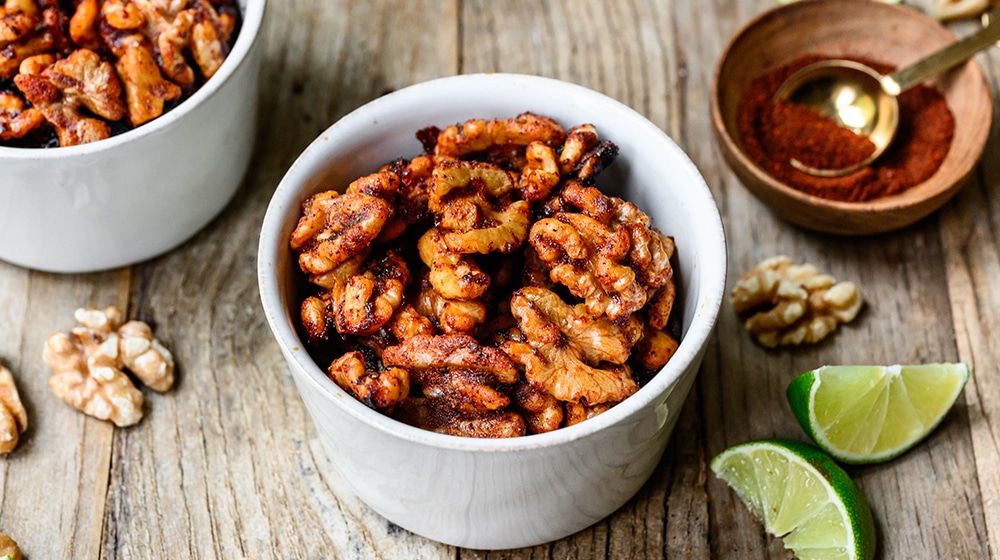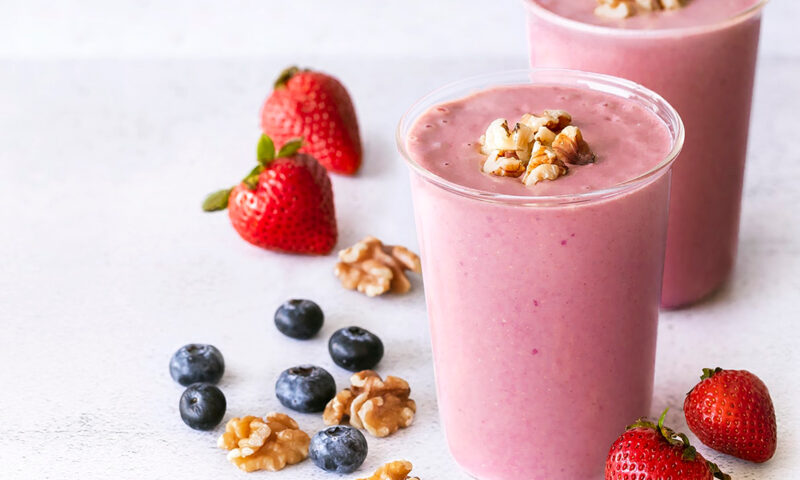
Simply put, for better well-being, focus on what you’re eating! Including nutrient-dense foods like walnuts into meals and snacks — that taste good and are good for you^ — is like doing double duty by making the foods you choose work hard for you. Did you know that one ounce of walnuts provides 4 grams of protein, 2 grams of fiber, and 2.5 grams of omega-3 ALA (that’s more than any other nut!)?1 Here’s how this small, but mighty nut can help jump-start your well-being this year.
- May help you stay fuller longer. Incorporating walnuts into meals and snacks is a simple and delicious way to add important nutrients into your diet. Feel full longer by eating a handful of walnuts per day. A study published in Nutrition showed that healthy, young adults who regularly consume foods that contain polyunsaturated fats (PUFA), like walnuts, may experience favorable changes in appetite hormones associated with hunger and satiety.2 Participants who consumed a PUFA-rich diet had a significant decrease in fasting ghrelin, a hormone that increases hunger, and a significant increase in peptide YY (PYY), a hormone that increases fullness or satiety. These hormone changes could help with better appetite control. Despite promising results, this study was small with only 26 participants and had a short duration of seven days. Larger and longer-term studies are needed to understand population-wide effects and it is difficult to know if the hormone changes in this study were due to a specific type of PUFA, food or a combination of overall dietary factors. Information on diet intake may have been limited because participants were free-living and data was self-reported. While the results of the study were not conclusive, these hormone changes could potentially help with better appetite control. A handful of walnuts is a simple way to help keep you full, thanks to a combination of key nutrients including plant-based protein, fiber and good fats. Walnuts are a versatile nut that pairs well with a variety of ingredients, contributing to different taste (sweet or savory) and texture (raw, toasted, or ground) profiles. Try adding them to your overnight oats or toss them in your morning smoothie — this Mixed Berry Walnut Chia Smoothie is a satisfying start to your day. If you need a midday pick-me-up, this Power Up with Plants Protein Box is a tasty, no-cook way to supply your body with some energy via toasted walnuts, creamy hummus, savory roasted chickpeas and fresh veggies.
- Could support gut health and immunity. You’ve likely heard all the buzz about maintaining a “good gut” and how doing so may be beneficial for your immune system, too. Good gut health has been linked to a variety of health benefits including those for digestion, metabolism and the immune system.3 In fact, a small study from the USDA and University of Illinois, published in The Journal of Nutrition, found that walnut consumption was associated with positive changes to the gut microbiome.4 18 study participants who ate 1.5 ounces or a large handful of walnuts each day for three weeks experienced an increase in beneficial gut bacteria and a decrease in secondary bile acids, which some studies suggest may play a role in colon cancer, inflammation, and gastrointestinal diseases. Larger and longer-term studies are needed to clarify these effects in broader populations and more research is needed to understand how specific bacterial species may be associated with favorable health effects. For more on walnuts and gut health, visit here.
- May benefit mental well-being. Did you know that walnuts may be good for your mental well-being too? One study that pooled dietary intake data from 26,656 participants and found that depression scores were 26% lower for walnut eaters compared to people who didn’t eat any type of nuts at all.5 Walnuts are the only nut to provide an excellent source of omega-3 ALA (2.5g/oz)6 and a recent study found ALA may influence changes in regions of the brain associated with emotional experiences.7 Additionally, another study found a higher dietary intake of ALA was significantly associated with a lower risk of clinical depression.8 Taken together, the results of these studies suggest that there may be an association between ALA intake and emotional well-being. However, no cause and effect has yet been definitively determined. More observational studies and clinical trials are needed to determine how ALA rich foods like walnuts help contribute to normal mood status and/or affect progression of mood disorders.
- May offer brain health support. One way to protect your brain health and promote healthy aging is by eating some good ol’ brain food. Evidence suggests that eating a diet containing a variety of vegetables, fruits, nuts, beans, and seafood during adulthood is associated with lower risk of age-related cognitive impairment, dementia, and Alzheimer’s disease.9 Walnuts are one of those foods. According to an epidemiological study published in The Journal of Nutrition, Health & Aging, participants who ate walnuts performed better on cognitive function tests for memory, concentration, and information processing speed than the control group.10 While these results are promising, it is not yet known whether adding walnuts to the diet would achieve the results in this study for the general population. So, when you’re looking for cooking inspiration, check out some of our favorite recipes here. You can learn more about walnuts and brain health in this recent article!
- Heart-healthy.11 Eating walnuts as part of a healthy diet may decrease your risk of heart disease, which is the leading cause of death globally. Walnuts help maintain healthy cholesterol levels and blood pressure, two of the major risk factors for heart disease.12 In a recent, two year study of elderly individuals, researchers found an association between regular daily walnut consumption and sustained lower levels of cholesterol and a 15 percent lower rate of cardiovascular disease.13 Despite these results, more research is needed to understand if these findings are applicable to all populations. Additionally, a 2022 scientific review published in Advances of Nutrition found that food sources high in plant-based omega-3 ALA, such as walnuts, should be part of a heart healthy eating pattern.14 A healthy heart contributes to overall wellness, so don’t forget to check out these heart-healthy recipes for inspiration.
These are just a few of the ways walnuts can help you achieve well-being. For more, visit our Wellness page.

Tips for including walnuts in a healthy diet
Try new recipes using walnuts by visiting our recipe collection for creative ways to incorporate walnuts into meals and snacks.
Grab a handful of raw walnuts to snack on four to five times per week. Or try one of these seasoned walnuts recipes for a simple and delicious snack or add then to your favorite salad or roasted veggies.
Make it meatless. Did you know that walnuts, when combined with mushrooms or legumes make a delicious plant-forward meat substitute? Get creative with your tacos, chili and more with these recipes.
Feeling like a treat? Healthfully indulge with these recipes made with better-for-you ingredients. These No-Bake Walnut, Cocoa, Cherry Bars are a crowd favorite, made with walnuts, maple syrup, Medjool dates, and tart dried cherries. Or try this Walnut, Chocolate and Avocado Mousse. This easy-to-make recipe combines walnuts with cocoa, honey and buttery avocado for pure plant-forward bliss!
For more how-to inspiration, visit our collection of Cooking with Walnuts videos.
Don’t forget to store your walnuts in the refrigerator or freezer so they stay fresh.
Walnuts are a simple and delicious food to include in your path to wellbeing this year. So grab a bag and get cooking!
Sources:
1 U.S. Department of Agriculture, Agricultural Research Service. FoodData Central, 2019. Fdc.nal.usda.gov.
2 Stevenson JL, Paton CM, Cooper JA. Hunger and satiety responses to high-fat meals after high polyunsaturated fat diet: a randomized trial. Nutrition. 2017;41:14–23. doi:10.1016/j.nut.2017.03.008
3Bischoff, S.C. ‘Gut health’: a new objective in medicine?. BMC Med 9, 24 (2011). https://doi.org/10.1186/1741-7015-9-24
4Holscher HD, Guetterman HM, Swanson KS, et al. Walnut Consumption Alters the Gastrointestinal Microbiota, Microbially Derived Secondary Bile Acids, and Health Markers in Healthy Adults: A Randomized Controlled Trial. J Nutr. 2018;148(6):861–867. doi:10.1093/jn/nxy004
5Arab L, Guo R, Elashoff D. Lower Depression Scores among Walnut Consumers in NHANES. Nutrients. 2019;11(2):275. doi.org/10.3390/nu11020275
6U.S. Department of Agriculture, Agricultural Research Service. FoodData Central, 2019. fdc.nal.usda.gov.
7Larrieu T, Laye S. Food for Mood: Relevance of Nutritional Omega-3 Fatty Acids for Depression and Anxiety. Front Physiol. 2018;9:1047. doi:10.3389/fphys.2018.01047\
8Lucas M, Mirzaei F, O’Reilly EJ, et al. Dietary intake of n-3 and n-6 fatty acids and the risk of clinical depression in women: a 10-y prospective follow-up study. Am J Clin Nutr. 2011;93(6):1337-1343.
92020 Dietary Guidelines Advisory Committee: Systematic Reviews of the Dietary Patterns, Foods and Nutrients, and Health Outcomes Subcommittee. (2021). https://nesr.usda.gov/2020-dietaryguidelines-advisory-committee-systematic-reviews/dietary-patterns-subcommittee/dietary-patternsneurocognitive-health.
10Arab L, Ang A. A cross sectional study of the association between walnut consumption and cognitive function among adult us populations represented in NHANES. J Nutr Health Aging. 2015;19(3):284-90.
11Supportive but not conclusive research shows that eating 1.5 ounces of walnuts per day, as part of a low saturated fat and low cholesterol diet and not resulting in increased caloric intake, may reduce the risk of coronary heart disease. (FDA) One ounce of walnuts offers 18g of total fat, 2.5g of monounsaturated fat, 13g of polyunsaturated fat including 2.5g of alpha-linolenic acid – the plant-based omega-3.
122Kris-Etherton P. Walnuts decrease risk of cardiovascular disease: a summary of efficacy and biologic mechanisms. J Nutr. 2014; 10: 39:2S-8S.
13 Rajaram S, Cofan M, Sala-Vila A, Haddad E, Serra M, Bitok E, Roth I, Freitas-Simoes TM, Kaur A, Valls-Pedret C, Domenech M, Oda K, Corella D, Sabate J, Ros E. Effects of walnut consumption for 2 years on blood lipids and lipoprotein subclasses among healthy elders: Findings from the Walnuts and Healthy Aging (WAHA) randomized controlled trial. Circulation. 2021;144:00–00. DOI: 10.1161/CIRCULATIONAHA.121.054051.
14Sala-Vila A, Fleming J, Kris-Etherton P, Ros E. Impact of alpha-linolenic acid, the vegetable omega-3 fatty acid, on cardiovascular disease and cognition. Advances in Nutrition. doi.org/10.1093/advances/nmac016.
^Supportive but not conclusive research shows that eating 1.5 ounces of walnuts per day, as part of a low saturated fat and low cholesterol diet, and not resulting in increased caloric intake, may reduce the risk of coronary heart disease. U.S. Food and Drug Administration, March 2004. One ounce of walnuts provides 18g of total fat, 2.5g of monounsaturated fat, 13g of polyunsaturated fat, including 2.5g of alpha-linolenic acid, the plant-based omega-3.



